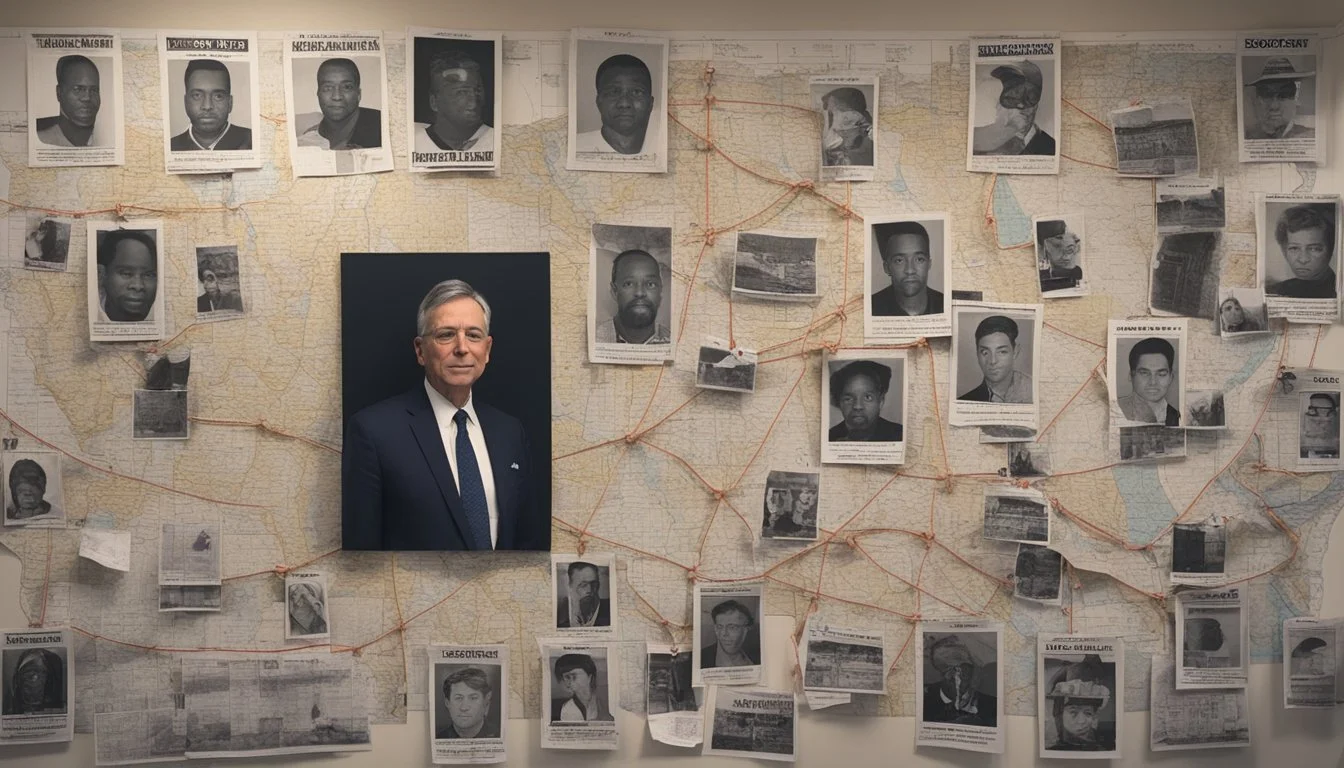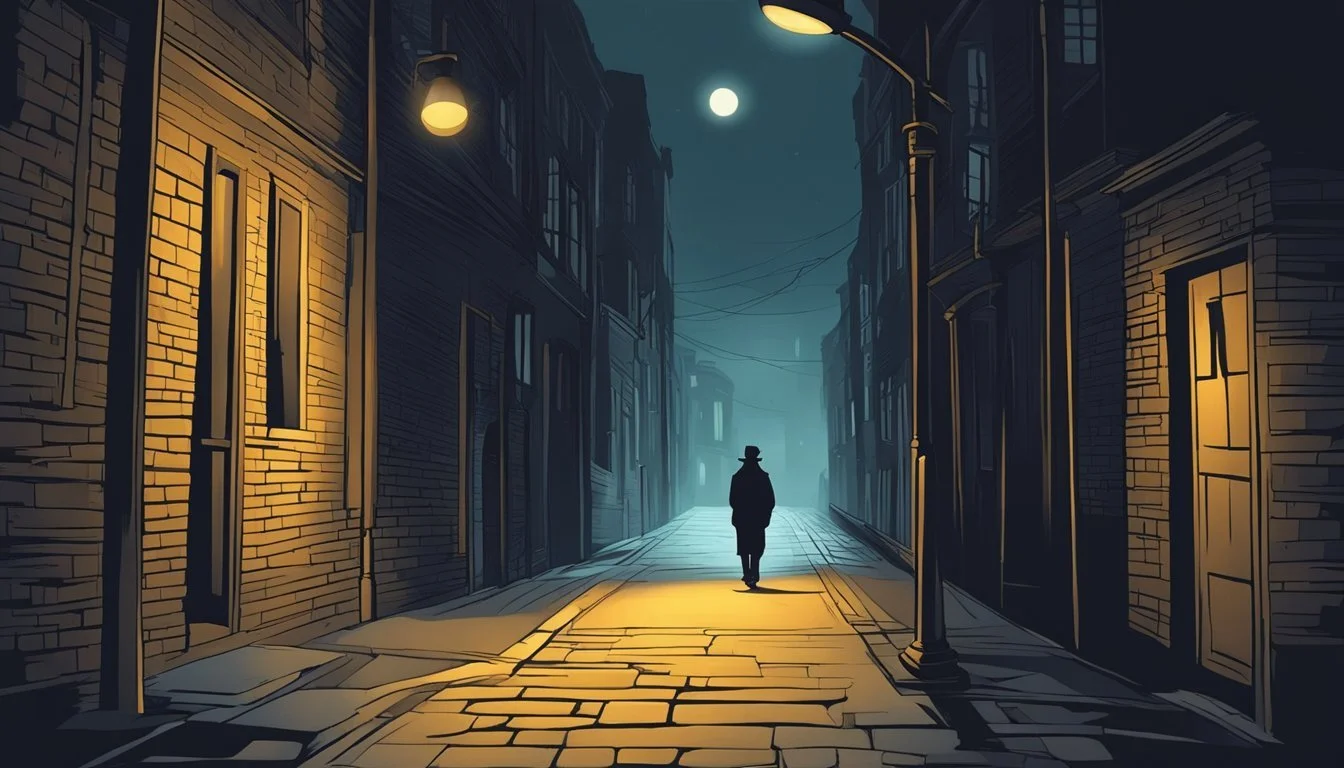Bobby Joe Long: 7 Harrowing Films on Florida's Classified Ad Rapist
A True Crime Media Analysis
Bobby Joe Long's horrific crimes in Florida during the 1980s have captivated true crime enthusiasts for decades. Known as the "Classified Ad Rapist," Long terrorized the Tampa Bay area with a series of brutal rapes and murders that left the community in fear.
Several films have attempted to portray Long's chilling story, offering viewers insight into the mind of a serial killer and the impact of his crimes on victims and their families. These productions range from documentaries to dramatized retellings, each providing a unique perspective on one of Florida's most notorious criminals.
1) Deliver Us from Evil
Deliver Us from Evil is a 2014 supernatural horror film directed by Scott Derrickson. The movie stars Eric Bana as Ralph Sarchie, a New York City police officer who investigates a series of disturbing crimes.
Sarchie teams up with an unconventional priest, played by Édgar Ramírez, to combat demonic possessions terrorizing the city. The film blends elements of crime thriller and supernatural horror.
While marketed as being inspired by actual accounts, the plot is largely a work of fiction. It draws loosely from a non-fiction book by the real Ralph Sarchie and Lisa Collier Cool.
The film features intense scenes of supernatural horror and crime investigation. It explores themes of faith, evil, and the battle between good and dark forces in an urban setting.
Deliver Us from Evil received mixed reviews from critics. Some praised its atmospheric tension and performances, while others criticized its reliance on horror genre tropes.
https://www.imdb.com/title/tt2377322/
2) Gone
"Gone" explores the chilling story of Bobby Joe Long through a fictional narrative. The film follows a detective on the trail of a serial killer targeting women in Florida.
While not a direct retelling, it draws inspiration from Long's crimes. The movie depicts the killer's method of using classified ads to lure victims, mirroring Long's modus operandi.
The protagonist races against time to catch the killer before he strikes again. This creates a tense atmosphere reminiscent of the fear that gripped Tampa Bay during Long's crime spree.
"Gone" takes creative liberties with the true events but captures the essence of the investigation. It highlights the challenges law enforcement faced in tracking down a cunning predator.
The film serves as a dramatic interpretation of one of Florida's most notorious serial killers. It brings attention to Long's crimes while crafting a suspenseful cinematic experience.
3) Trust
"Trust" is a 2010 psychological thriller film that delves into the dark world of online predators. Directed by David Schwimmer, the movie stars Clive Owen and Catherine Keener as parents whose teenage daughter falls victim to an internet predator.
While not directly based on Bobby Joe Long's crimes, "Trust" explores similar themes of manipulation and exploitation. The film highlights how predators like Long can gain victims' trust through deception and grooming tactics.
"Trust" received praise for its sensitive handling of a difficult subject matter. It sheds light on the vulnerabilities that can be exploited by criminals like Long who prey on trusting victims.
The film serves as a cautionary tale about the dangers lurking online. It emphasizes the importance of open communication between parents and children to help prevent such victimization.
https://www.imdb.com/title/tt1529572/
4) A Killer Among Us
"A Killer Among Us" is a true crime documentary that delves into the chilling case of Bobby Joe Long. The film provides a detailed account of Long's crimes and the investigation that led to his capture.
Interviews with law enforcement officials and survivors offer firsthand perspectives on the terror Long inflicted on the Tampa Bay area. The documentary explores how Long evaded capture for months while continuing his killing spree.
Viewers gain insight into Long's background and the factors that may have contributed to his violent behavior. The film also examines the lasting impact of his crimes on the victims' families and the community.
"A Killer Among Us" highlights the breakthrough in the case that finally brought Long to justice. It presents a thorough analysis of the evidence and investigative techniques used to link Long to the murders.
The documentary serves as a sobering reminder of the dangers that can lurk within communities. It underscores the importance of vigilance and cooperation between law enforcement and the public in solving complex criminal cases.
5) The Craigslist Killer
"The Craigslist Killer" is a 2011 made-for-television film that draws parallels to Bobby Joe Long's case. While not directly about Long, it explores similar themes of predatory behavior facilitated by classified ads.
The movie focuses on Philip Markoff, a medical student who used Craigslist to find victims. Like Long, Markoff exploited the anonymity of classified ads to target vulnerable women.
Director Stephen Kay brings a tense atmosphere to the film, highlighting the dangers of online interactions. Jake McDorman portrays Markoff, capturing the unsettling duality of a seemingly normal person hiding dark impulses.
The film serves as a modern counterpart to Long's story, showing how predatory tactics evolved with technology. It demonstrates that the dangers Long represented in the 1980s continue to exist in new forms today.
"The Craigslist Killer" offers viewers a chilling look at how classified ads can be weaponized by criminals, echoing the methods used by Bobby Joe Long decades earlier.
https://www.imdb.com/title/tt1800275/
6) Taken
"Taken" is a 2008 action thriller that draws parallels to the Bobby Joe Long case. The film stars Liam Neeson as Bryan Mills, a former CIA operative who uses his skills to rescue his daughter from human traffickers.
While not directly based on Long's crimes, "Taken" explores themes of abduction and the exploitation of women. The protagonist's relentless pursuit of his daughter's kidnappers echoes the determination of law enforcement in tracking down Long.
The film's intense scenes of kidnapping and violence may remind viewers of the terror Long inflicted on his victims. However, "Taken" portrays a more hopeful outcome, with the protagonist successfully rescuing his daughter.
"Taken" became a box office success and spawned two sequels. Its popularity brought attention to the real-world issues of human trafficking and violence against women, topics that intersect with the Bobby Joe Long case.
https://www.imdb.com/title/tt0936501/
7) Kidnap
"Kidnap" is a 2017 thriller film starring Halle Berry that draws inspiration from real-life abduction cases, including those of Bobby Joe Long. The movie follows a mother's frantic pursuit of her son's kidnappers.
While not directly based on Long's crimes, "Kidnap" captures the terror and desperation experienced by victims of abduction. The film's intense car chases and high-stakes confrontations mirror the urgency felt by those affected by Long's actions.
Berry's character embodies the determination of survivors like Lisa McVey, who escaped from Long and helped bring him to justice. The film showcases the lengths a person will go to protect their loved ones from predators.
"Kidnap" serves as a reminder of the impact of crimes like Long's on families and communities. It highlights the importance of awareness and vigilance in preventing such tragedies.
https://www.imdb.com/title/tt1458169/
Background of Bobby Joe Long
Bobby Joe Long was a notorious serial killer who terrorized Florida in the 1980s. His troubled upbringing and psychological issues contributed to his violent criminal behavior.
Early Life and Psychological Profile
Born on October 14, 1953, in West Virginia, Long endured a difficult childhood. He suffered from a chromosomal disorder that caused excessive female hormone production, leading to bullying and emotional problems.
Long experienced head injuries as a child and teenager, which may have affected his behavior. He married his high school girlfriend at 21 but struggled with relationships and anger issues.
Psychologists noted Long's narcissistic personality traits and lack of empathy. These factors, combined with his troubled past, likely influenced his later criminal actions.
Criminal History
Long's criminal activities began with a series of rapes in the early 1980s. He earned the moniker "Classified Ad Rapist" for using newspaper ads to find victims.
In 1984, Long escalated to murder. He killed at least eight women in the Tampa Bay area over an eight-month period. His victims were typically young women he abducted, sexually assaulted, and strangled.
Long was captured in November 1984. He confessed to multiple murders and rapes. Convicted of several crimes, Long received multiple life sentences and the death penalty for the murder of Michelle Simms.
Investigation and Capture
The investigation into Bobby Joe Long's crimes involved extensive law enforcement efforts and clever use of classified ads to track him down. These tactics ultimately led to his capture and arrest in 1984.
Law Enforcement Efforts
Detectives from multiple Florida jurisdictions worked tirelessly to solve the string of murders and rapes. They analyzed crime scene evidence, interviewed witnesses, and created profiles of the suspect.
Task forces were formed to coordinate resources across agencies. Investigators noticed similarities between cases, linking them to a single perpetrator.
DNA evidence collected from victims played a crucial role. Police also used fiber analysis and tire track impressions to build their case.
Survivor Lisa McVey provided key details about her abductor after escaping, helping police narrow their search.
Use of Classified Ads
Long earned the moniker "Classified Ad Rapist" due to his method of finding victims through newspaper ads. He would respond to listings for household items, often targeting women selling items alone.
Police placed decoy ads to lure the suspect. They monitored responses and set up surveillance operations at meeting locations.
This strategy proved effective when Long was arrested after contacting an undercover officer posing as a potential victim through a classified ad.
Investigators found evidence in Long's car and home linking him to multiple crimes. The clever use of ads, combined with traditional police work, finally brought the serial killer to justice.
Impact on Society
Bobby Joe Long's crimes deeply affected Florida communities and drew widespread media attention. His actions sparked fear and changed behaviors, while also shining a spotlight on issues of public safety and law enforcement responses to serial killers.
Effect on Florida Community
Long's killing spree terrorized Tampa Bay area residents in 1984. Women became more cautious about their daily activities and interactions. Many avoided going out alone, especially at night. Local businesses saw decreased foot traffic as people stayed home out of fear.
Law enforcement increased patrols and warnings. Neighborhood watch groups formed. Self-defense classes saw a surge in attendance. The community rallied to protect vulnerable populations like sex workers who were frequently targeted.
Long's use of classified ads to find victims made people more wary of these listings. Classified ad companies implemented stricter screening processes. The case highlighted the need for better safety practices when meeting strangers.
Media Coverage
The murders received extensive local and national media coverage. News outlets ran frequent updates on the investigation and victim stories. Some critics argued the sensationalized reporting increased public panic.
Long's eventual capture and trial were widely televised. The case sparked debates about capital punishment and treatment of serial killers. True crime books and documentaries followed, analyzing Long's motives and methods.
Media attention raised awareness about violence against women and sex workers. It led to discussions on improving support systems for at-risk individuals. The case also prompted scrutiny of police procedures for handling serial killer investigations.







